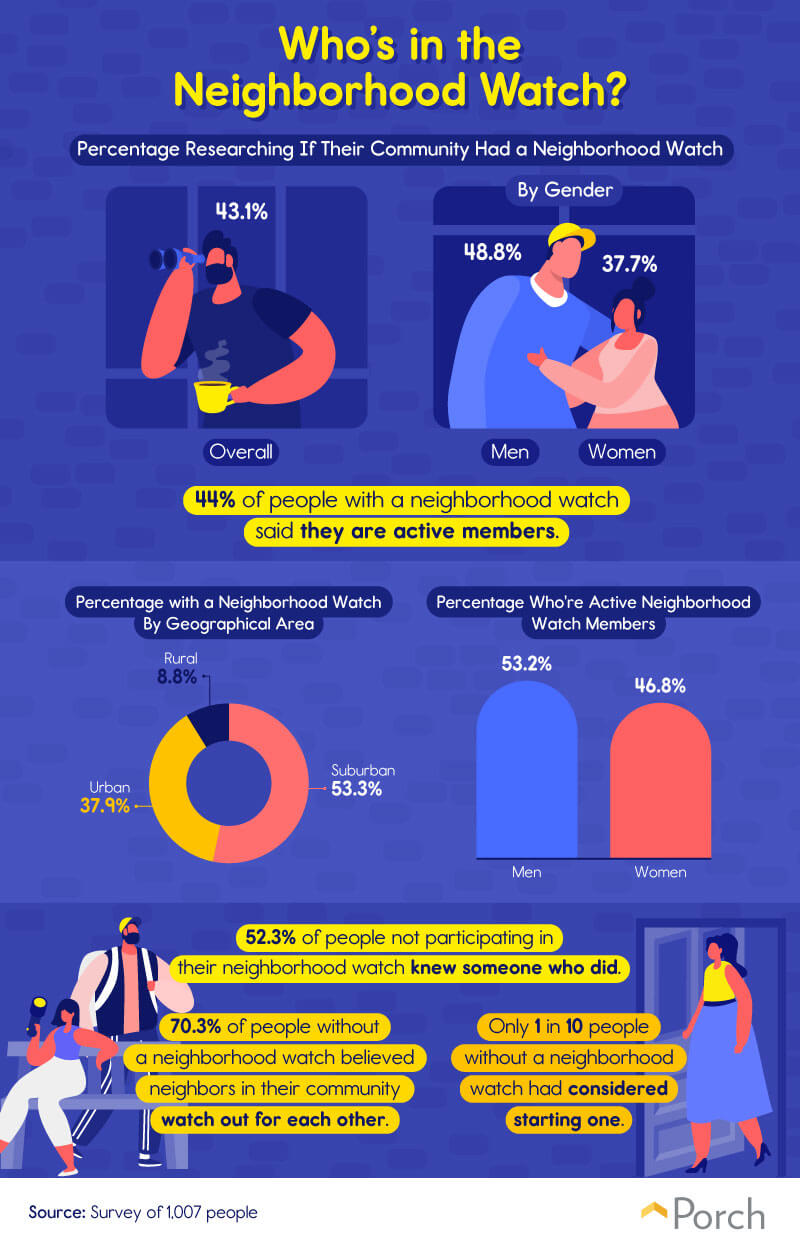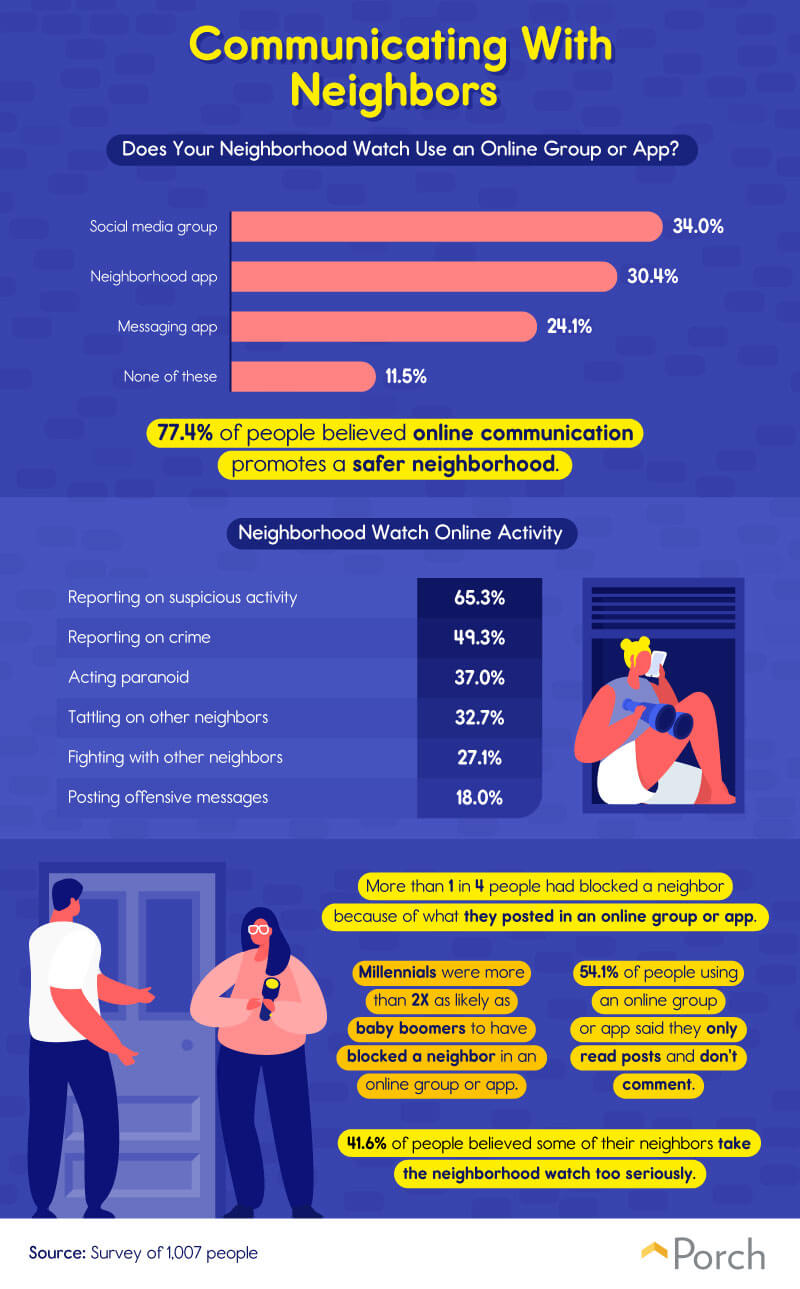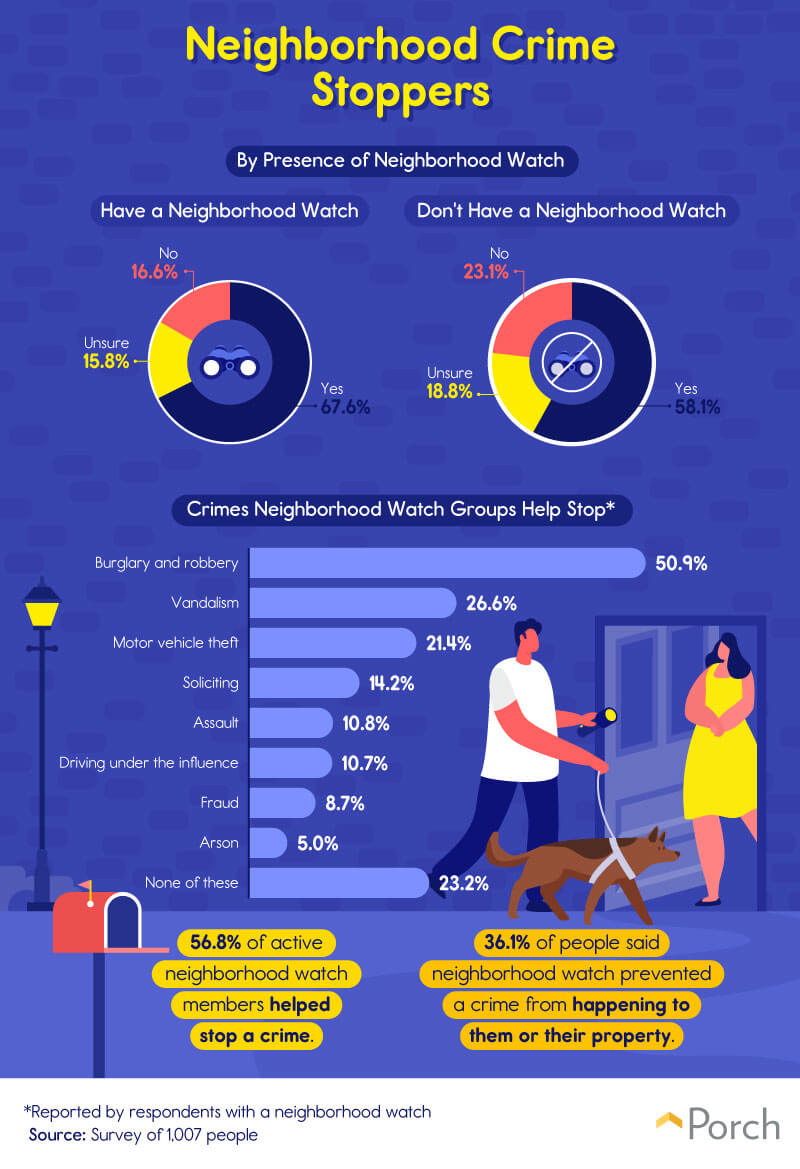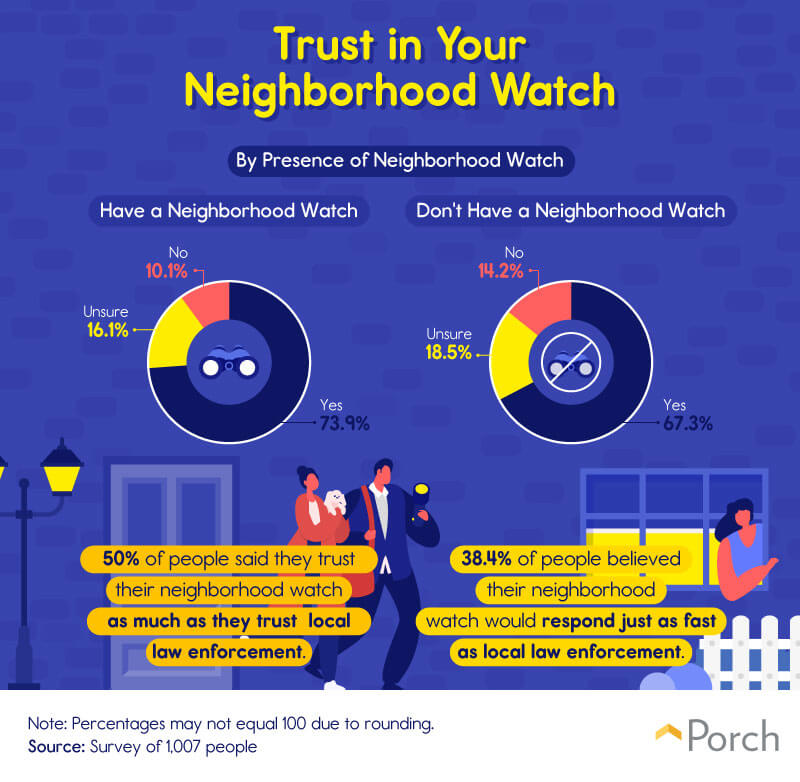If you thought the neighborhood watch was just slang for your mother’s group of vigilant friends, think again. It’s a crime-stopping, safety-encouraging group of citizens who care about the health and vibrancy of their local communities. In all likelihood, the neighborhood watch has contributed to your safety and the safety of those around you.
What do you think of your neighborhood watch? Do you feel it’s keeping you safe? What about compared to local law enforcement? And which crimes are these citizens actually able to stop? We surveyed over 1,000 Americans, many of who were actively involved in their local neighborhood watches, to help paint a true picture of these organized groups. Continue reading to see what we found.
Nuances of the neighborhood watch
 Neighborhood watches were a common interest for respondents: 43 percent of respondents had researched whether their local community had a neighborhood watch, while 44 percent were active members. If you’re part of the 57 percent who haven’t checked, the information can be found on the national registry. But even if a local neighborhood watch hasn’t yet been listed, you are free to register your own so long as it has authentic ties to local law enforcement. That said, only 1 in 10 people surveyed had considered starting their own group.
Neighborhood watches were a common interest for respondents: 43 percent of respondents had researched whether their local community had a neighborhood watch, while 44 percent were active members. If you’re part of the 57 percent who haven’t checked, the information can be found on the national registry. But even if a local neighborhood watch hasn’t yet been listed, you are free to register your own so long as it has authentic ties to local law enforcement. That said, only 1 in 10 people surveyed had considered starting their own group.
So, who exactly gets involved in their local neighborhood watch group? Men were more likely than women to check for groups as well as be active members. The suburbs also correlated with a higher likelihood of these groups: Around 53 percent of suburban households had a neighborhood watch in their area, compared to less than 9 percent in rural areas and almost 38 percent in urban communities.
Regrouping with the neighborhood

The internet had a heavy hand in neighborhood watch groups. Nearly 89 percent of those in a neighborhood watch group used some online group or app to communicate with the neighborhood. Thirty-four percent used social media, 30.4 percent communicated via a neighborhood app, and another 24.1 percent spoke through a messaging app.
But what did this communication lead to? Over 77 percent felt that online communication promoted a safer neighborhood. But some experts have articulated the opposite, claiming “the internet has helped vigilantism and conspiracy theories thrive” with spaces for “just about anyone to share their suspicions.” And the data we uncovered may actually demonstrate this point: The top activity, reported by 65.3 percent of respondents, was neighbors reporting suspicious activity online. Thirty-seven percent even admitted that the chatter was mostly neighbors being paranoid.
In addition to the undue paranoia the internet may have brought to the neighborhood watch, these message boards even tore some neighborhood friendships apart: 27 percent said they had fought with other neighbors online, and 1 in 4 had to block their neighbors due to offensive content.
Watch group efficacy

Although local communication demonstrated room for improvement, neighborhood watch groups were certainly not all bad. In fact, these groups stopped everything from burglary and robbery (50.9 percent) to vandalism (26.6 percent) and drunk driving (10.7 percent). Overall, 67.6 percent agreed their neighborhood watch was effective.
According to the San Jose Police Department, picking up the phone and reporting suspicious activity is one of the most effective ways to prevent a robbery from happening. Stopping assault proved more difficult for these groups but not impossible: Nearly 11 percent of respondents in a neighborhood watch reported stopping an assault. Even without the protection of law enforcement or neighborhood watch groups, there are many steps your community can take to better protect its citizens.
Trusting the area
 The following statistic may be encouraging or concerning: Neighborhood watch groups were trusted just as much as local law enforcement. Ultimately, this could mean one of three things: The neighborhood watch is overperforming, local law enforcement is underperforming, or both are equally effective—all of which feels surprising.
The following statistic may be encouraging or concerning: Neighborhood watch groups were trusted just as much as local law enforcement. Ultimately, this could mean one of three things: The neighborhood watch is overperforming, local law enforcement is underperforming, or both are equally effective—all of which feels surprising.
Even more surprising is that 38.4 percent believed their neighborhood watch would respond in the same amount of time as local law enforcement. All of this said, those currently in a neighborhood watch program were nearly 7 percentage points more likely to trust their neighborhood watch.
Watching out for each other
The neighborhood watch has humble beginnings: the simple desire to keep one another safe. Fortunately, the data seems to track these honorable roots through to fruition, demonstrating the neighborhood watch’s ability to stop a host of violent and nonviolent crimes.
However, extra precaution can be taken in any home—local watch groups or not. One of the first precautions a home can take is to trust the people who are allowed inside. This means working with reputable contractors and brands when looking to move or start any project. At Porch, the safety of your home and belongings is our No. 1 priority when helping you with various home projects. If you’d like to move, improve, or chat about your options, head to Porch today to get started.
Methodology and limitations
To collect the data shown above, we surveyed 1,007 respondents. Of the respondent pool, 704 had a neighborhood watch, 153 did not have a neighborhood watch, and 150 were unsure if their community had one. The respondent pool was 51.1 percent female, 48.7 percent male, and less than 1 percent who chose a different option. Because the survey relies on self-reporting, issues such as telescoping and exaggeration can influence responses. An attention-check question was included in the survey to make sure respondents did not randomly answer.
Fair use statement
Even if you’re not in the neighborhood watch, you can look out for your local community online. You’re welcome to share the data in this article so long as it’s for noncommercial purposes, and you link back to this page.

